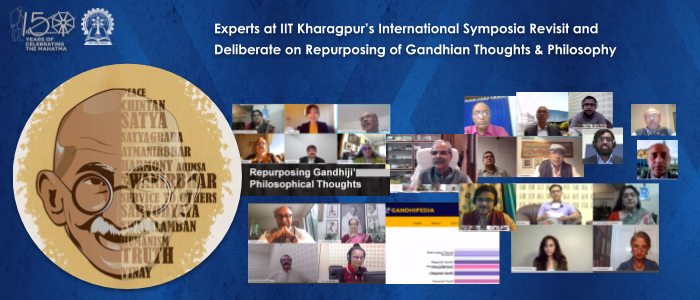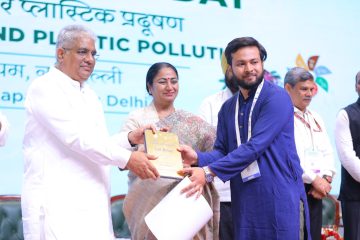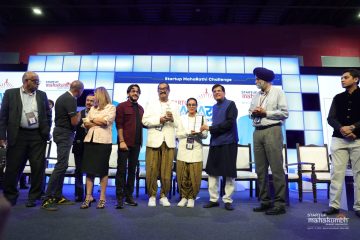IIT Kharagpur’s month-long celebration of Mahatma Gandhi’s 150th birth anniversary ended yesterday, August 28, 2020. The international e-symposia which started on August 8, the anniversary of the launch of the Quit India Movement in 1942, could not have a more befitting close than the day marking the anniversary of the historic civil rights march at Washington DC in 1963 and the iconic speech of Martin Luther King Jr. – “I have a dream”. With India journeying through the pandemic, global economic turmoil, trade war with China and the ‘Atma Nirbhar Bharat’ mantra of Govt. of India, we Indians are embracing a dream, and not so strangely this dream is quite similar to one, once explored by the man who shaped the history of modern India – Mahatma Gandhi. The five symposia organised by IIT Kharagpur in association with global universities in USA, UK, Canada, Australia and New Zealand, reaffirmed the fact of Gandhiji’s relevance in possibly all facets of our socio-economic lives.
Swavalamban
On August 8, Prof. Brent Ryan from MIT emphasized the need for incorporation of self-reliance in urban planning and design and sustainability in the neighborhood. He related this idea to Gandhiji’s philosophy of Swavalamban or the quest for self-reliance. This thought found its confirmation in the talk by Dr. Shobhna Radhakrishna from the Gandhian Forum for Ethical Governance, who talked about how her life at the Ashram taught them self-sufficiency even in growing their own food. Prof. Ryan spoke about how green spaces in neighbourhood can help in community networking, education and employment. Speaker Arunendu Banerjee, on August 15, rightly pointed out the need to understand the practicality and technicality of Swavalamban for realizing Atma Nirbhar Bharat. Moderator of the symposium Prof. Anjali Gera Roy reminded the audience of the idea of self-reliant communities upheld by Mahatma Gandhi as embodied in traditional mohallas and paras and how he encouraged women’s progress through active participation in the socio-political movement.
Sarvodaya
The speakers also explored the major philosophy of the Mahatma – Sarvodaya. This concept of universal upliftment or progress for all, is India’s very own answer to socialism, finding its roots in the 5000 year old Rig Veda. While Prof. Biswapriya Sanyal from MIT spoke about its application in post-independence India through the organisation SEWA, Prof. Partha Ghosh of Tufts university explained its nuances as an enlightened state, encompassing leadership, economics and sustainability.
The concept of Sarvodaya was revisited again on August 20 by Prof. Swagato Chatterjee from IIT Kharagpur’s Vinod Gupta School of Management, who remarked on Gandhiji’s philosophy of inclusive self-reliance and how he advocated for it in developing essential industries and sustainable technologies, public trade and utilities, and even socio-cultural behaviour i.e. holistic adoption Atma Nirbhar Bharat. On August 27, Dr. Surender Munjal from Leeds University further dived into social economic justice and spirituality which was the basis of Gandhian economic thought including his agreement with free enterprise and surplus while simultaneously promoting ethical production, public welfare and equitable distribution. He highlighted how Gandhiji’s Swadeshi movement was able to reduce British imports by 50% which is an inspiration in the current mission of Atma Nirbhar Bharat.
The Mahatma, His Brand, His Legacy
The later phases of the symposia further explored Mahatma Gandhi as an influencer in public life including civil rights movements and commercialisation of Mahatma Gandhi through his mythologized aura. On August 20, Prof. Anindita Ghosh spoke about how Gandhian non-violence has repeatedly found its place in the movement of Martin Luther King Jr, Nelson Mandela, Vietnam war and even in progressive movements such as feminism, LGBTQ rights, social justice, anti-war movement and even in the initial phase of the Black Life Movement.
Prof. Ritu Khanduri narrated mythologization of Mahatma Gandhi from the pre-independence era till 21st century by local businesses and multinational corporations and foreign companies in the brand communication, the cult following and popularity, public reactions both favourable and protests, the commercialization and imagery of a public figure. Moderator Prof. Chhanda Chakraborti reminded us to introspect on what should be the extent of freedom of speech in communication without leading to its misuse and trivialization of a person and a public figure.
Fast, Yoga and Wellbeing
Healthcare researchers, Prof. Partha Roop and Mr. Aron Jeremiah from University of Auckland and Dr. Giresh Kanji, a clinical health expert, went on to explore Gandhian practices in health and well-being on August 27. Was the famous Gandhian fast just a means of protest against the British Raj? The trio said Gandhiji’s public movement actions were more than mere protests. While Dr. Kanji explained the benefits of intermittent fasting, Prof. Partha Roop explained how the Mahatma promoted yoga and meditation for cardiac performance, metabolism, brain function, mental health and overall wellbeing.
Buniyadi Shiksha – Gandhian Education
While the symposia was delving into a broad scope of deliberations, how can the domain of education stay behind. Gandhian thoughts repeatedly called for educational reforms. Today India is celebrating and even debating the New Education Policy, but the Mahatma had conceived several elements of this policy a hundred years back. His concept of Buniyadi Shiksha (Fundamental Education), an education revolutionizing the wants of the poorest villagers, reflecting national condition in national education, could be found sporadically. Prof. Anjali Gera Roy spoke of the Centre for Rural Development and Innovative Sustainable Technology at IIT Kharagpur which is meeting one of the goals of Gandhian concept of education.
“By education I mean an all-round drawing out of the best in the child and man—body, mind and spirit,” the Mahatma had opined. This was reflected in the talk of Prof. Udaya Parampalli from University of Melbourne on August 27. He spoke about academic honesty as a character building practice in the teaching and learning itself, understanding and addressing an issue such as plagiarism, ensuring life-long ethical behaviour following a natural response.
On August 28 Prof. Mijung Kim from University of Alberta elaborated on how the Mahatma’s holistic educational goals inspired incorporation of sustainable development goals of the United Nations and promoting science education in the school education system. She was joined by Prof. Reva Joshee from University of Toronto who shared the work being done in Canada on Gandhian ideas and education under the patronage of Mahatma Gandhi Canadian Foundation for World Peace.
Prof. Florence Glanfield from University of Alberta, moderator and speaker on August 28 further explained how Gandhian thoughts, especially Ahimsa at its core, have been making their mark in teaching, research, and administration through experiential knowledge and community building. And to connect it with technology, Prof. Animesh Mukherjee from IIT Kharagpur in association with IIT Gandhinagar and supported by the Ministry of Culture has developed Gandhipedia, an AI-enabled repository on Gandhian literature and educating youth in this domain.
Ahimsa, Saranagati
Talking about Ahimsa, the signature mark of Gandian movement, the topic was championed by Prof. Chhanda Chakraborti from IIT Kharagpur on August 28. A philosophy scholar herself, Prof. Chakraborty accentuated the repurposing of the concept of Ahimsa towards developing code of conduct in our overall lifestyle including education and industry. She touched on the very objective of the symposia – deliberations on repurposing of Gandhian thoughts and philosophy in the context of the 21st century challenges and our journey ahead. Not very far from the thoughts Prof. Kanchan Chowdhury from IIT Kharagpur resonated the introspection of Mahatma Gandhi’s spirituality which was the driving force behind his thoughts and philosophies would help in better adaptability of the same in our lives.
The event was organised by the Office of Alumni Affairs and Office of International Relations, IIT Kharagpur under an initiative of the Ministry of Education, Govt. of India.
Prof. Virendra Tewari, Director, IIT Kharagpur congratulated the organising body for this grand celebration of bringing together academics from nine universities in five countries in a matter of less than two weeks.
“Mahatma Gandhi’s life itself is an eternal and universal education system encompassing discipline, time management, health and wellbeing, self-reliance and inclusivity. Bapu is our blood and we are raised with his memories, his ideas. One of his ideas that has influenced me profoundly is his concept of time management.” he said referring to how the academics fathomed the various thoughts and philosophies of Mahatma Gandhi within limited time.
The symposia found its apt closure in Gandhiji’s favourite song ‘Vaishnava Jana To’, written in the 15th century by the poet Narsinh Mehta in the Gujarati language, performed by Prof. Anandaroop Bhattacharya, a professor of Mechanical Engineering searching his soul’s universal connections through music, in the spirit of the Mahatma’s idea of pursuing fine arts beyond the alphabet of learning.




